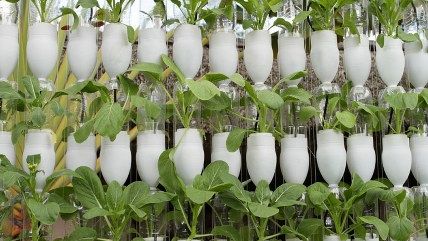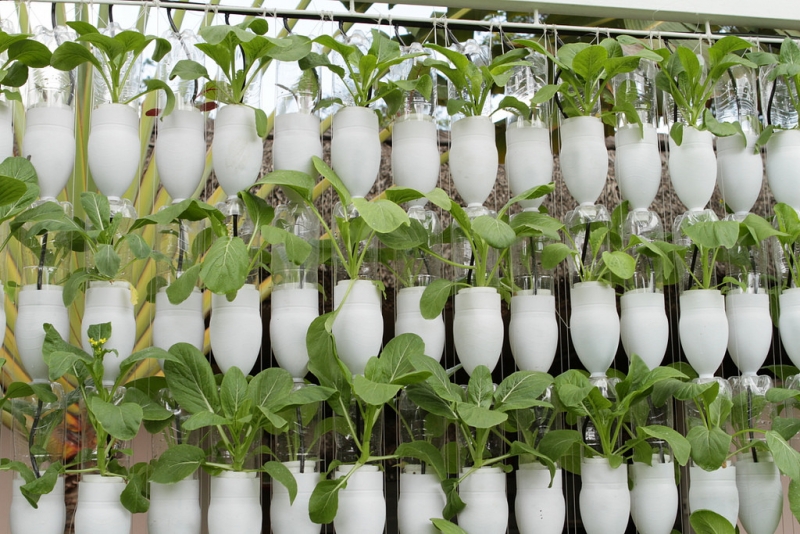Who Should Decide if 'Hydroponic' is 'Organic'?
A controversy highlights the need to get the USDA out of organic food altogether. (Even a major newspaper thinks so!)


When most people think of hydroponics, marijuana and tomatoes come to mind. But there's more to hydroponics. And—wouldn't you know it—the "more" involves more regulations.
The USDA is currently considering whether hydroponic crops should be eligible to earn the USDA organic seal. They've been eligible to earn that status since 2002. But that could change thanks to a USDA-appointed "Organic Hydroponic and Aquaponic Task Force" that's making recommendations on the issue.
Under USDA rules, the term "organic" is as much about what is used to produce food as what isn't produced.
Organic food means 1) the food is "[p]roduced without excluded methods," which include genetic and the use of sewage sludge; 2) the food is "[p]roduced using allowed substances[,]" which are reflected on a list the USDA's controversial National Organic Standards Board (NOSB) maintains and updates; and 3) the food produced under the rules above is "[o]verseen by a USDA National Organic Program-authorized certifying agent[.]"
The NOSB suggested in the mid-1990s that hydroponics can be organic, but suggested in later years that they can't.
A recent meeting of the agency's NOSB, which is deliberating the hydroponics issue, ended with a call for more deliberation.
The Cornucopia Institute, which recently filed a complaint with the USDA over hydroponic organics, has denigrated hydroponic crops as "largely imported" and grown "on an industrial scale." But the same is also often true of soil-grown, organic-certified crops.
The idea that hydroponic crops might be organic, says Civil Eats, is "causing considerable distress among the many farmers who believe the U.S.—like elsewhere around the world—should forbid organic certification of food grown in anything other than soil." But if this image is to be believed, farmers opposed to the USDA continuing to grant organic status to hydroponic crops appear to be suffering from something closer to mild consternation, rather than considerable distress.
Supporters of organic hydroponics make a strong case for continuing its status under USDA law.
Marianne Cufone, an adjunct environmental law professor at Loyola University New Orleans, listed many benefits of hydroponic farming in a recent CNN op-ed and noted "a number of scientists, researchers, and industry experts support that many such farms are ideal for organic growing, because, among other benefits, they make smart use of resources and thus have less negative impact on the natural environment."
So are organic hydroponics the end of the world? Or are they, rather, its savior? I neither care nor need to decide that here.
It's not hard to make the case that soil is as central to the concept of "organic" as any other idea or thing. As one history of the early organic food movement in America suggests, soil was at the heart of the country's first organic-certifying body, Oregon Tilth, which was founded in the early 1970s and still serves as an organic certifier today. The word "tilth" means cultivated soil.
On the other hand, it's also not hard to make the case that soil isn't central to the concept of what is and isn't organic. While most of our food is grown in soil, only a small percentage of that food is "organic" under USDA rules. In other words, whether or not food is grown in soil tells us little that's useful about whether that food is "organic" or not.
It's worth noting too that—any way you look at it—the "hydro" in hydroponic refers to water, which is organic by any conceivable definition. It's both a naturally occurring compound and a necessary component of organic agriculture. In fact, it's necessary in a way that soil isn't. Without soil, there's hydroponics. Without water, there's no life. And no organic agriculture.
All that said, it seems we've a robust debate about the issue. The only downside to that debate is that it pertains to regulations, and that one side will win not because it prevailed within consumers in the marketplace of ideas but because it won over a majority of the handful of members of a USDA-appointed committee.
It was, in this spirit, that a truly wonderful Boston Globe editorial last week argued that organic food is not "about facts and dictionaries" and called on the USDA to get out of the organic-oversight business altogether.
"It would be better for the authorities to focus on ensuring the safety of food and the accuracy of label information about things like nutrition and allergens, while letting consumers figure out for themselves what organic means to them," write the Globe's editors. "Farmers who grow crops only in soil and want to market themselves to consumers that way have every right to try, and if enough customers care then they'll be successful. But asking the federal government to define and enforce the boundaries of personal beliefs is just too much to ask."
Amen to that.


Show Comments (108)